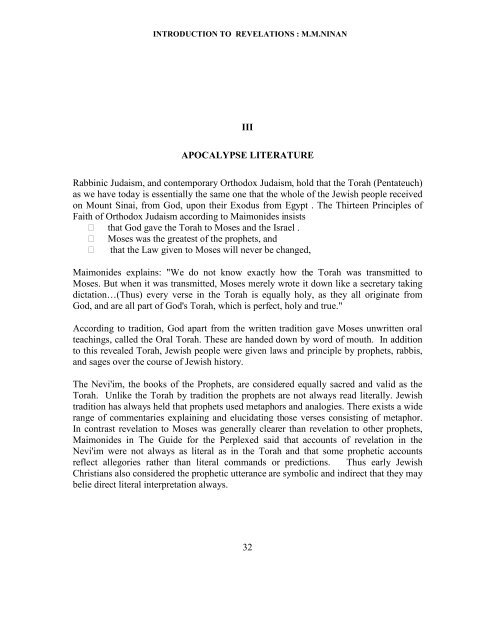Revelation Introduction
Create successful ePaper yourself
Turn your PDF publications into a flip-book with our unique Google optimized e-Paper software.
INTRODUCTION TO REVELATIONS : M.M.NINAN<br />
III<br />
APOCALYPSE LITERATURE<br />
Rabbinic Judaism, and contemporary Orthodox Judaism, hold that the Torah (Pentateuch)<br />
as we have today is essentially the same one that the whole of the Jewish people received<br />
on Mount Sinai, from God, upon their Exodus from Egypt . The Thirteen Principles of<br />
Faith of Orthodox Judaism according to Maimonides insists<br />
that God gave the Torah to Moses and the Israel .<br />
Moses was the greatest of the prophets, and<br />
that the Law given to Moses will never be changed,<br />
Maimonides explains: "We do not know exactly how the Torah was transmitted to<br />
Moses. But when it was transmitted, Moses merely wrote it down like a secretary taking<br />
dictation…(Thus) every verse in the Torah is equally holy, as they all originate from<br />
God, and are all part of God's Torah, which is perfect, holy and true."<br />
According to tradition, God apart from the written tradition gave Moses unwritten oral<br />
teachings, called the Oral Torah. These are handed down by word of mouth. In addition<br />
to this revealed Torah, Jewish people were given laws and principle by prophets, rabbis,<br />
and sages over the course of Jewish history.<br />
The Nevi'im, the books of the Prophets, are considered equally sacred and valid as the<br />
Torah. Unlike the Torah by tradition the prophets are not always read literally. Jewish<br />
tradition has always held that prophets used metaphors and analogies. There exists a wide<br />
range of commentaries explaining and elucidating those verses consisting of metaphor.<br />
In contrast revelation to Moses was generally clearer than revelation to other prophets,<br />
Maimonides in The Guide for the Perplexed said that accounts of revelation in the<br />
Nevi'im were not always as literal as in the Torah and that some prophetic accounts<br />
reflect allegories rather than literal commands or predictions. Thus early Jewish<br />
Christians also considered the prophetic utterance are symbolic and indirect that they may<br />
belie direct literal interpretation always.<br />
32


















